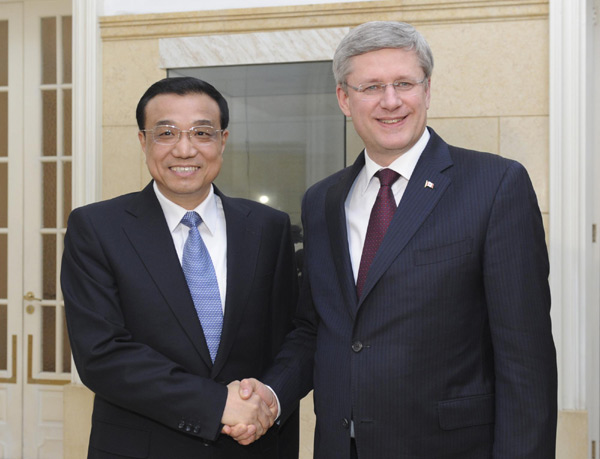Sino-Canadian ties to cover more sectors
President and vice-premier target stronger Canada economic relations
BEIJING – China is willing to increase imports from Canada and to boost cooperation in energy and other areas, Chinese leaders said on Thursday.
During a meeting with Canadian Prime Minister Stephen Harper, President Hu Jintao said cooperation should be strengthened across a range of sectors.
“The countries should enhance political dialogue to expand common ground,” Hu said.
To boost trade links, Hu suggested that the potential of both economies to interact be realized and cooperation expanded.
Vice-Premier Li Keqiang called for the countries to “promote energy trade”.
|
 Vice-Premier Li Keqiang (L) shakes hands with Canadian Prime Minister Stephen during a meeting in Beijing on Thursday. [Photo/Xinhua] |
“Canada is a nation that has bountiful energy resources, and China is a stable and reliable consumption market”, he said in a keynote speech at a Beijing business forum.
And the two nations should also enhance energy cooperation, including renewable and nuclear, and promote joint oil and mining projects, he said.
“We should ensure a stable partnership in the field of energy resources,” Li said.
Harper is leading a delegation of more than 40 business executives during his visit as he endeavors to sell more oil to China, attract Chinese investment in Canada and win more access to China for Canadian companies.
Harper’s visit comes as Canada plans to diversify exports of crude oil to Asia, including China, and aims to speed up the regulatory-approval process for large energy projects. This comes on the heels of US President Barack Obama rejecting TransCanada Corp’s $7 billion pipeline to the US Gulf Coast.
“The potential for China-Canada economic and trade cooperation has never been bigger than today,” Li said.
“We are glad to see that Canada is diversifying its trade and investment and stressing the importance of the Asian market,” Li said.
“Asia is the most dynamic and potential region worldwide in terms of economic growth and China is a major economy in Asia.”
China plans to expand domestic consumption and develop strategic emerging sectors.
Harper’s visit has resulted in a number of deals on energy. Canadian businesses signed nearly $3 billion worth of deals with Chinese enterprises on Thursday.
Canada reached an agreement with China on Thursday to facilitate uranium exports by giving Canadian uranium producers more access to China’s civilian nuclear power industry.
China could start receiving Canadian oil as early as 2016 if a pipeline project from Alberta to Canada’s Pacific coast goes ahead, said Enbridge Pipelines chairman Patrick Daniel, who accompanied Harper on the visit.
Harper agreed with Li by saying that China-Canada economic relations are “reaching a new level”.
After meeting President Hu Jintao on Thursday, Harper said: “I think Canada-China relations are continuing along a very positive route.
“Canada has the resources, technological sophistication and geo-strategic positioning to complement China’s economic growth strategy,” he said.
“And China’s growth, in turn, complements our determination to diversify our export markets.”
China is Canada’s second-largest trading partner. Bilateral trade stood at almost $50 billion in 2011, up $6 billion from 2009. The two countries set a target of increasing bilateral trade to $60 billion by 2015.
“There is more room for us to enlarge bilateral trade, as it is still small,” Li said.
Premier Wen Jiabao said on Wednesday the two nations should discuss the possibility of signing a free trade agreement.
Two-way investment
“We welcome Canadian companies to invest in China’s western, central and northeastern regions. We also encourage Chinese companies to invest in Canada,” Li said.
On Wednesday, the two nations concluded negotiations on a foreign investment promotion and protection agreement, which began in 1994.
Canadian investment in China surged by 39 percent year-on-year in 2010 to $5 billion. Chinese investment in Canada totaled $14 billion during the same period, up by 9 percent from 2009.
China has been encouraging its enterprises to expand globally, and experts have said that the current global slowdown has provided a number of investment opportunities.
Source: China Daily
